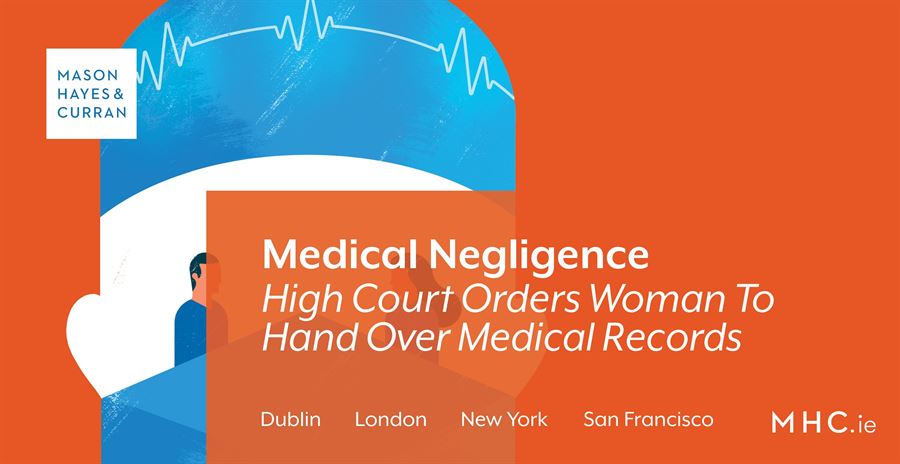High Court Orders Woman To Hand Over Medical Records
 A recent High Court ruling highlights the importance in medical negligence claims of hospitals being able to investigate the allegations against them before being required to deliver a defence.
A recent High Court ruling highlights the importance in medical negligence claims of hospitals being able to investigate the allegations against them before being required to deliver a defence.
Background
This claim arose out of an ectopic pregnancy in 2017. The woman underwent surgical removal of her fallopian tubes and sued the hospital alleging negligence in the manner that the surgery was performed, and in the communication of certain test results to her following the surgery.
The hospital had asked the woman’s solicitor for a copy of her medical records, explaining that the original records had been misplaced. The woman had a copy of the mislaid records but her solicitor refused to provide the records and stated that once a defence was delivered, the discovery process would be engaged with. In January 2020, the woman’s solicitor issued a motion for judgment in default of defence.
Hospital “hamstrung” 
The court referred to the Supreme Court judgment of McGrory v ESB[1] where Chief Justice Keane had observed:
“Once proceedings have been instituted, such an examination and full access to the plaintiff’s medical records and interviews with his medical advisors are of assistance in enabling the defendants to form a view as to the amount of damages which the plaintiff is likely to recover and of any lodgement which they should prudently make in court with their defence. Whether or not liability is a live issue in the case, making such material available to the defendant at an early stage of the litigation, instead of withholding it until the action itself when it will have to be produced, can only facilitate the earlier settlement of actions.”
Chief Justice Keane explicitly stated that the right of access to medical records is not dependant on whether a defence has been delivered or not.
Without a copy of the medical records, the hospital could not investigate the claim or get independent expert reports. The judge said that without access to these records, the hospital was “hamstrung” in terms of its investigations and having an expert look at the issues of breach of duty and causation.
The court therefore ordered that a copy of the mislaid medical records be handed over to the hospital so that, in the interests of all the parties, the proceedings could progress with due expedition. The hospital was given 12 weeks from the receipt of the medical records to deliver a defence.
Key Takeaways
Prompt progression of cases a priority for court
This judgment makes it clear that the court will take a pragmatic view in favour of the prompt progression of cases. The court is in favour of information being provided to defendants at the early stage of litigation so that they can fully investigate matters before delivering a defence. This saves court time that may be taken up with amending defences or progressing claims which could have been settled had the defendant been able to fully investigate the claim.
A role for voluntary discovery at an early stage
While the general rule is that formal requests for discovery are made after the defence is delivered, provision has to be made for circumstances where a defendant is deprived of key documents needed to investigate the claim.
This judgment provides some comfort to defendant hospitals faced with a plaintiff pressing for a defence without providing a copy of key medical records to allow a complete investigation of the claim. In such circumstances, hospitals would be well advised to issue an early formal request for discovery. Plaintiffs should take heed and understand that making material available at an early stage of litigation, before pleadings have closed, will be encouraged and welcomed by the courts.
For any further information, please contact a member of our Healthcare & Medical team.
[1] [2003] 3 IR 407
The content of this article is provided for information purposes only and does not constitute legal or other advice.
Share this:



